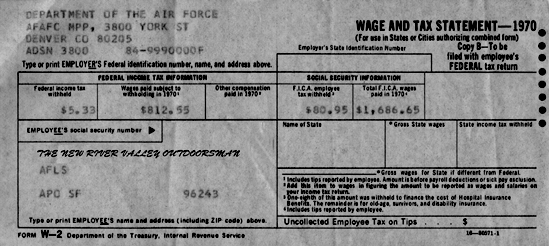INFLATION

Cleaning out a closet I came across some old papers from my days in the Air Force. Above is the W-2 Form I found for the year 1970. I went on active duty on 15 January. On 15 August of the same year, exactly eight months later, I shipped out for Vietnam, returning on 15 August 1971. For the first eight months I was subject to income taxes, but in Vietnam I wasn't. From August to December 1970 I was also receiving hostile fire pay and overseas pay, similarly non-taxable.
In the first eight months of 1970 I was paid all of $101 per month, before taxes (and yes, I had to pay income tax on that pittance). The last four months, August to December, I hit the Big Time: I earned $874.10, all of $218.53 per month. (I was promoted to E-3 mid-tour, at which point, as I recall, my monthly pay was $251.00, all "extras" included.) As my wife pointed out I did receive food and housing, such as they were, as well as medical care gratis; but still, even in 1970 $1200 or so per year was starvation wages.
That was of course 50 years ago, so out of curiosity I looked up the pay tables for enlisted personnel today. In 2020 an E-1 (Airman Basic, what I was in the first eight months) makes $1681; after promotion to E-2 (Airman) he gets bumped up to $1884. That works out to $20,172 to $22,608 per year. It's roughly eighteen to twenty times what I made as an E-1 and E-2, but it's still starvation wages.
Military personnel are on duty 24/7/365, and often literally risk their lives for peanuts. Deaths in training accidents aren't unknown; furthermore, once an airman, sailor, or soldier is finished with basic training he can easily find himself in a dangerous occupation. Military flying is in and of itself hazardous; if you're in the Navy or Coast Guard, you find yourself living inside a huge machine full of dangerous equipment, all too often in foul weather. Low-level enlistees in the Army or Marines end up on the sharp end of the stick for that kind of pay.
We now have all-volunteer armed forces, and the military—very wisely, given their experience with draftees decades ago—insists that enlistees have at least a high school education. Someone who has a high school diploma can get a job in a fast-food restaurant or a supermarket that pays more than the military does, doesn't expose him to serious danger, and offers some prospect of significant career advancement. At $13 per hour (the minimum wage in some states; it's higher in some others) a worker can earn $27,000 per year working 40 hours per week, more if he does overtime. It's tough to live on that, especially considering that food, housing, and probably medical care have to be paid out of it; but nobody's shooting at you, ordering you to stand on an open deck in a storm or jump out of the cargo door of an airborne C-130.
There are many motivations for people to join the military services but money sure isn't one of them.
| HUNTING | GUNS | DOGS |
| FISHING & BOATING | TRIP REPORTS | MISCELLANEOUS ESSAYS |
| CONTRIBUTIONS FROM OTHER WRITERS|
| RECIPES |POLITICS |